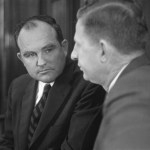Prime
 Where Things Stand: Willing Hostages With No Agenda
Where Things Stand: Willing Hostages With No Agenda 
Former President Trump spoke at a GOP convention gathering in North Carolina over the weekend, where he not only gave his endorsement in the state’s crowded Republican primary for an open Senate seat, but also vowed to continue weighing in on races that will be crucial to the party’s midterm success.
The key ingredient to earning that coveted Trump endorsement, of course, remains fealty to the former president and his ongoing list of grievances.
Sometimes a writer will take a bundle of ideas that have been floating around in a lot of other peoples’ heads and commit them to paper with clarity and concision. If you are one of the other people in whose mind the ideas have been floating, seeing this happen can be both illuminating and annoying. But if someone else wrote them down before you did it likely wasn’t just a matter of speed. It was because you hadn’t done the work of taking the inchoate impressions and feelings that occupy all of our minds and whittling them down to concrete assertions and arguments that others can readily understand. We don’t really know what we think until we are able to commit it to the written word.

I got a decent amount of pushback on this rather pessimistic post I published Friday evening about the fate of the President’s legislative agenda – particularly for saying the White House was ‘adrift’. This is particularly about the President’s two big infrastructure bills. But it’s also about the President’s broader and quite ambitious legislative agenda – S1/H1 and a raft of other bills which would require some tweaking or squeezing of the filibuster because they can’t be passed through the 50 vote reconciliation process and they won’t get 60 votes.
First, it’s good to hear from you. If you’re involved in the process either at the White House or on the Hill or in the broader para-political process, please get in touch. Hit me at the main TPM email or my personal email and if you need a secure messaging option I can make that happen too.
On to the details.
 How the Death of a 99 Year Old Arch-Segregationist Helps Explain The Trumpite GOP
How the Death of a 99 Year Old Arch-Segregationist Helps Explain The Trumpite GOP 
John Patterson, former segregationist Governor of Alabama, died on Friday at the age of 99. In an interview with The Washington Post for what would later be his obituary, he said “Having a record of supporting segregation is a terrible burden to bear.” In 2008 he announced he’d be voting for Barack Obama for President, 50 years after his election as Governor.
Patterson is one of the last in a pretty long list of segregationist luminaries who later came to regret and recant their support for Jim Crow. We’re right to have limits on our patience for too much of these latter-day apologies. But Patterson’s story is instructive for understanding the current drive of radicalization within the Republican party.
All of these guys were segregationists to start with and all of them were racists, certainly by the standards of today and in pretty much every case by the standards of their own. But pretty few of them were the most racist and few got into politics with strong positions either way on segregation or the racial politics of their day.

I’ve mentioned a few times that Israel appears to be on course for a Jan 6th type moment. The possibility of that seems much more serious than when I first suggested it. The chance that Netanyahu and his supporters will be able to break free a few defectors from the new coalition government and prevent it from being sworn in seems perhaps to be diminishing. But the chance of violence of some sort or at least the expectation of it seems to be growing rapidly. The head of Israel’s domestic security service, the Shin Bet, just issued what seems to be an all but unprecedented warning that the climate of incitement threatens not only violence but a breakdown of the democratic order itself. The message seems clear aimed at Netanyahu without mentioning him by name.

Benjamin Netanyahu’s dozen years as Israel’s Prime Minister are most likely coming to an end. The new government should be sworn in sometime next week. But it’s still not a done deal because Netanyahu and many of his supporters view his removal from office – even by a unity government led by one of his former proteges – as existential. I’ve mentioned several times the January 6th analogy. But every political system has different mechanisms and every country has a unique political culture. So how could Netanyahu manage to remain in power either by norm-busting but still technically legitimate means or by extra-legal and extra-constitutional means?
Let’s start with the central fact: For the moment the new government is only a proposed government. To come formally into power it must be approved by a vote of 61 members of the Knesset, the country’s parliament. The coalition has to keep everyone on board for several days so they cast those 61 votes.
 Israel Gallops Toward Its Own Jan 6th
Israel Gallops Toward Its Own Jan 6th 
By rights, it’s over and in effect it probably is over. Last night Israel’s opposition finalized and formally agreed to create a coalition government that will remove Benjamin Netanyahu from power. The coalition stretches from the right to the left and includes an Arab Israeli Islamist party. The architect of the new government is opposition leader Yair Lapid, whose deftness, patience and self-abnegation in this effort is really hard to capture or overstate. He has the signed document, which will make the right-wing Naftali Bennett Prime Minister for the government’s first two years, and he’s brought that to the country’s President. In the Israeli system, that’s it, all but the formality of the parties who just agreed to the deal voting it into power in the Knesset, Israel’s parliament.
But Netanyahu isn’t letting go.
 TPM Inside Briefing With Paul Krugman
TPM Inside Briefing With Paul Krugman 
Yesterday we held an Inside Briefing with Paul Krugman in which we discussed pretty much all the economic policy questions (and the political debates growing out of them) of the early Biden presidency. We talk about the Biden infrastructure plan, inflation, chronic under-investment, Larry Summers, whether deficits matter and more.
If you’re a member, you can watch our discussion after the jump. I think you’ll enjoy it.
 Where Things Stand: Trump Is Only Now Catching Up To The MyPillow Guy
Where Things Stand: Trump Is Only Now Catching Up To The MyPillow Guy 
By now you’ve likely seen new reporting from the New York Times’ Maggie Haberman: Former President Trump is telling people that he expects he will be “reinstated” to the presidency in August.

